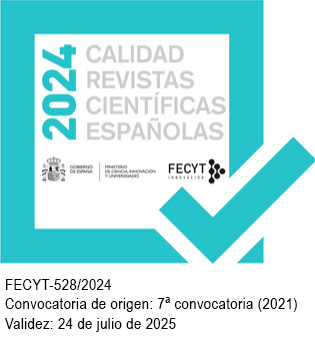Motion Verbs with a Change of Property Reading
doi: https://doi.org/10.31810/rsel.55.1.3
Keywords:
Event structure; qualia structure; motion verb; achievement; change of propertyAbstract
In this paper we study the meaning of some motion verbs that, when combined with certain nouns that refer to places or institutions associated with prototypical activities, can give rise to readings in which there is either a change of location or an acquirement/loss of a quality or condition. In order to account for these readings, we posit that the meaning of words is structured into different components that interact by means of lexical operations and propose an analysis based on the agreement of the sub-lexical features that are encoded by the verb and its selected noun. Furthermore, we show that the readings in which there is a change of property are not unconstrained, but rather they are regulated by the type of the noun that is selected, its number (singular or plural) and the occurrence of certain adjuncts.
Downloads
References
Batiukova, O. y E. De Miguel (2020). Multilingual Electronic Dictionary of Motion Verbs (DICEMTO). En M. J. Domínguez Vázquez, M. Mirazo Balsa y C. Valcárcel Riveiro (eds.): Studies on Multilingual Lexicography. Número monográfico de Lexicographica 157, 67-91. doi: https://doi.org/10.1515/9783110607659-005.
Carlson, G. (1977). Reference to Kinds in English. Tesis doctoral. University of California.
De Miguel, E. (1999). El aspecto léxico. En Ignacio Bosque y Violeta Demonte (eds.): Gramática descriptiva de la lengua española, vol. II, 2977-3060. Madrid: Espasa Calpe.
De Miguel, E. (2004a). Qué significan aspectualmente algunos verbos y qué pueden llegar a significar. En Cifuentes, J. L. y C. Marimón (coords.): Estudios de Lingüística: el verbo. Alicante: Estudios de Lingüística de la Universidad de Alicante, 167−206.
De Miguel, E. (2004b). La formación de pasivas en español. Análisis en términos de la estructura de qualia y la estructura eventiva, Verba Hispanica XII, 107-129.
De Miguel, E. (2009). La Teoría del Lexicón Generativo. En E. De Miguel (ed.): Panorama de la Lexicología. Barcelona: Ariel, 337−368.
De Miguel, E. (2012). Verbos de movimiento en predicaciones sin desplazamiento espacial. En B. Kalenić Ramšak et al. (eds.): Actas del III Simposio Internacional «La percepción del tiempo en lengua y literatura» (Ljubljana, noviembre 24-26, 2011). Número monográfico de Verba Hispanica XX/1, 185−210.
De Miguel, E. (2019). La recategorización léxica. Nombres colectivos y nombres recategorizados como colectivos. Revista Signos. Estudios de Lingüística 52, 531-559.
De Miguel, E. (2022a). Adjuntos, aspecto léxico y significado verbal: un análisis sub-léxico. Borealis: An International Journal of Hispanic Linguistics 11(3), 193⎼228.
De Miguel, E. (2022b). Los adjuntos en la construcción del significado verbal. Lingüística 62(1), 27-51. doi: https://doi.org/10.4312/linguistica.62.1-2.27-51.
De Miguel E. y O. Batiukova (2017). Compositional mechanisms in a generative model of the lexicon. En S. Torner Castells y E. Bernal Gallén (eds.): Collocations and other lexical combinations in Spanish. Theoretical, Lexicographical and Applied Perspectives. London/New York: Routledge, 92-113.
De Miguel, E. y M. Fernández Lagunilla (2000). El operador aspectual se. Revista Española de Lingüística 30(1), 13−43.
De Miguel, E. y M. Fernández Lagunilla (2004). Un enfoque subeventivo de la relación entre predicados secundarios y adverbios de manera. Revue Romane 39(1), 22−44.
De Miguel, E. y M. Fernández Lagunilla (2007). Sobre la naturaleza léxica del aspecto composicional. En Actas del VI Congreso de Lingüística General. Madrid: Arco/Libros, 1767−1778.
Dowty, D. (1979). Word Meaning and Montague Grammar. Dordrecht: Reidel.
Fábregas, A. (2012). A guide to IL and SL in Spanish: Properties, problems and proposals. Borealis: An International Journal of Hispanic Linguistics 1(2), 1-71. doi: https://doi.org/10.7557/1.1.2.2296.
Fábregas, A. (2022). Lexical aspect in Spanish: contrasts, syntactic structures and semantic interpretations. Borealis: An International Journal of Hispanic Linguistics 11(3), 1-191. doi: https://doi.org/10.7557/1.11.3.6692.
García-Pardo, A. (2020). Stative Inquiries. Causes, results, experiences, and locations. Amsterdam/Philadelphia: John Benjamins Publishing Company.
Jaque, M. (2014). La expresión de la estatividad en español. Niveles de representación y grados de dinamicidad. Tesis doctoral. Universidad Autónoma de Madrid.
Luo, Y. (2020). Los verbos de desplazamiento en el lexicón generativo chino y español: un estudio de la polisemia. Shanghái: Shangai Foreign Language Education Press.
Marín, R. (2013). La stativité dans tous ses états. Mémoire de synthèse. Université Paris 8.
Marín, R. (2022). Los mejores diagnósticos sobre estados reunidos. Borealis: An International Journal of Hispanic Linguistics 11(3), 229⎼246.
Martínez-Atienza, M. (2021). Entre el léxico y la sintaxis: las fases de los eventos. Berna: Peter Lang. doi: https://doi.org/10.3726/b17633.
Moreno, J. C. (2003). Semántica y gramática. Sucesos, papeles semánticos y relaciones sintácticas. Madrid: Antonio Machado Libros.
Morimoto, Y. (2001). Los verbos de movimiento. Madrid: Visor.
Pustejovsky, J. (1991). The Syntax of Event Structure. En B. Levin y S. Pinker (eds.): Lexical and Conceptual Structure. Oxford: Blackwell, 47-81.
doi: https://doi.org/10.1016/0010-0277(91)90032-Y.
Pustejovsky, J. (1995). The Generative Lexicon. Cambridge, Mass., MIT Press.
Pustejovsky, J. (2006). Type Theory and Lexical Decomposition. Journal of Cognitive Science 7(1), 39-76. https://www.researchgate.net/publication/228616762.
Pustejovsky, J. (2011). Coercion in a General Theory of Argument Selection. Linguistics 49(6), 1401-1431. https://doi.org/10.1515/ling.2011.039.
Pustejovsky, J. y J. Aravind (2017). Lexical Factorization and Syntactic Behavior. LiLT 15(1), 1-22. doi: https://doi.org/10.33011/lilt.v15i.1407.
Pustejovsky, J. y O. Batiukova (2019). Lexicon. Cambridge, Cambridge University Press. doi: https://doi.org/10.1017/9780511982378.
Vendler, Z. (1957). Verbs and Times. The Philosophical Review 66(2), 143⎼160.
Zato, Z. (2020). The role of state-kinds in the morphosemantics of Spanish deadjectival nominalizations. Tesis doctoral. Euskal Herriko Unibertsitatea / Universidad del País Vasco.
Published
How to Cite
Issue
Section
Copyright (c) 2025 Revista Española de Lingüística

This work is licensed under a Creative Commons Attribution-NonCommercial-NoDerivatives 4.0 International License.










